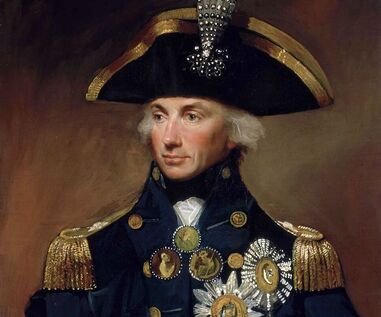 To see a video presentation on this article, click here To see a ScreenCapture presentation on this article, click here To view a PowerPoint presentation on this article, click here. To listen to an audio presentation on this article, click here. The Most Important and Decisive Naval Engagement The Battle of Trafalgar, fought 21 October 1805, was one of the most important and decisive Naval engagements of all time, decisively establishing the supremacy of the Royal Navy on the high seas. Rather than a conventional engagement between lines of battle with gunnery duels, the English made a bold attack that allowed them to gain local superiority over the enemy and raked their ships with devastating broadsides. The Franco-Spanish fleet was decisively defeated and British supremacy on the high seas was decisively established for the rest of the 19th century. Lord Nelson's defeat of the French and Spanish fleets at Trafalgar allowed British trade to flourish around the world, laying the foundations for Britain's emergence as an economic superpower. It also made possible the Greatest Century of Missions, as Protestant missionaries were able to sail to every corner of the world. The Royal Navy's domination of the high seas brought an end to the slave trade in the 19th Century. Britain vs. France The war between Great Britain and France was a clash between a great naval power verses a great land power. In the same year that Emperor Napoleon of France won his greatest land victory at Austerlitz, his plan to invade the British Isles was destroyed by the victory of Lord Nelson at the Battle of Trafalgar, off the coast of Spain.
0 Comments
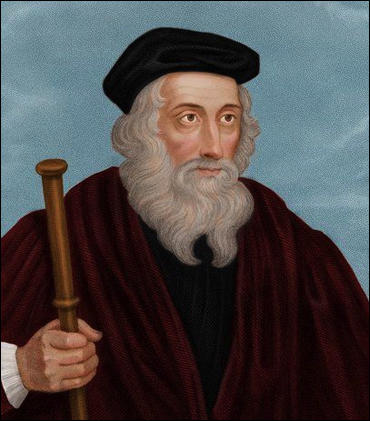 In the 14th Century, Oxford was the most outstanding university in the world and John Wycliffe was its leading Theologian and philosopher. The Black Death (the Bubonic Plague), which killed a third of the population of Europe, led Wycliffe to search the Scriptures and find salvation in Christ. The King’s Champion As a professor at Oxford University, Wycliffe represented England in a controversy with the pope. Wycliffe championed the independence of England from Papal control. He supported King Edward III’s refusal to pay taxes to the pope. (It was only one step away from denying the political supremacy of the pope over nations to questioning his spiritual supremacy over churches). The royal favour which Wycliffe earned from this confrontation protected him later in life. Wycliffe’s patron and protector was John of Gaunt. This English prince was the most powerful political figure in late 14th Century England. Gaunt, known in his day as the Duke of Lancaster, was effectively the Prime Minister of England during the last years of the 50-year reign of his then senile father, King Edward III. Gaunt was “a wise diplomat, a bold soldier, the epitome of chivalry, hard on his enemies and always faithful to what he believed was best for England.” In 1399 Gaunt’s son ascended the throne as King Henry IV. 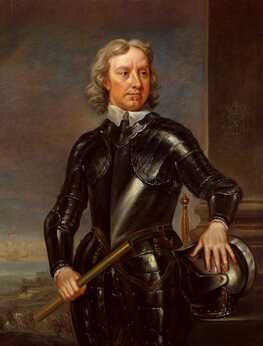 Oliver Cromwell (1599-1658) was one of the greatest leaders ever to rule England. He was a dedicated Puritan, deeply and fervently devoted to carrying out the will of God. He was relentless in battle, brilliant in organization and had a genius for cavalry warfare. With a Psalm on his lips and a sword in his hand he led his Ironsides to victory after victory, first against the Royalists in England, then against the Catholics of Ireland, and finally against the rebellious Scots. Oliver Cromwell pursued religious toleration which helped to stabilize the fragile country after the King was executed. His foreign policy in support of beleaguered Protestants in Europe and against Muslim pirates in the Mediterranean was successful and he restored the supremacy of the seas to England. 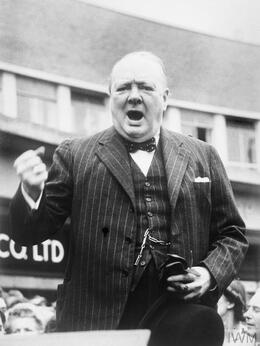 Darkest Hour highlights Winston Churchill’s extraordinary eloquence and showcases some of his most famous war time speeches. In his first address to the House of Commons as Prime Minister on 13 May, “I have nothing to offer but blood, toil, tears and sweat… you ask, what is our policy? I will say, it is to wage war! By sea, land and air! With all our might and with all the strength that God can give us; to wage war against the monstrous tyranny, never surpassed in the dark, lamentable catalogue of human crime… you ask, what is our aim? I can answer in one word: Victory, victory at all costs, victory in spite of all terror; victory however long and hard the road may be!” Marshalling the English Language for War As an observer noted, Winston Churchill marshalled the English language and sent it into war. Certainly his policy of war at all costs, meant an extremely long and hard ruinous road for the people of England, Europe and indeed the whole British Commonwealth. Was it Really Necessary? But the film Darkest Hour does raise the question: Was it necessary? Could Britain have chosen the road of peace and negotiation? That indeed is the whole premise of Patrick Buchanan’s book, Churchill, Hitler and the Unnecessary War – How Britain Lost its Empire and the West Lost the World. 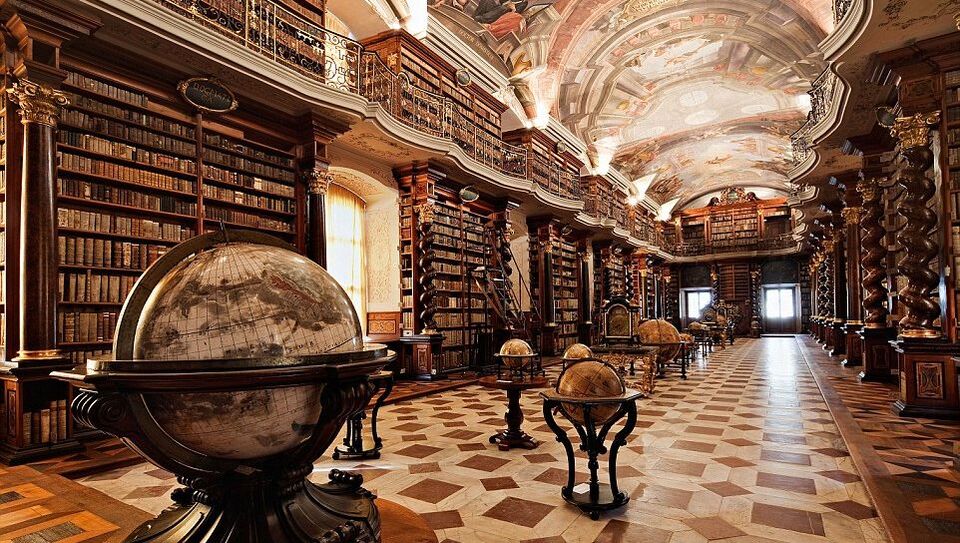 A study of the great classics of English literature is absolutely essential for a true education. The English classics have played a key role in teaching individual virtue and for laying foundations for western civilisation. Character Shaping Reading the works of William Shakespeare, John Milton, Jane Austen and Charles Dickens, helps us exercise our minds and enrich our experiences. Great Christian literature enables us to recognise truths, appreciate beauty and admire what is virtuous. The literary classics include drama that purges our minds, with breath-taking intensity, heart-breaking pathos and poetry that makes us hunger and thirst after virtue and courage. Good literature enables us to recognise what is truly beautiful and honourable. It helps shape our character by teaching us to despise what is dishonourable, to love what is noble and to aspire to higher standards in our own lives. Foundational in Education In his 1950 Nobel Literature Award acceptance speech, William Faulkner described the primary duty of authors to remind men “of the courage and honour and hope and pride and compassion and pity and sacrifice which have been the glory of his past.” The study of great works of literature have always been considered foundational in education. 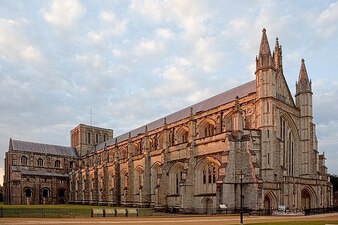 Excellence in Engineering Even secular architects and engineers have to admit that the greatest examples of excellence in architecture are the cathedrals. Extraordinary Sacrifice and Dedication When you consider the limited technological resources available to architects, builders and craftsmen, who built the medieval cathedrals - with wooden scaffolding, hand tools and boats that transported the stones from quarries to the building sites, each of these cathedrals represent staggering sacrifices and amazing achievements. Awesome Architecture Many of the great cathedrals of Britain were built a thousand years ago! These cathedrals are far more than monuments to a vibrant and living Faith. They have been meeting places for generations of Christian communities, the focal point of Christian work and witness throughout the Middle Ages to the present day. 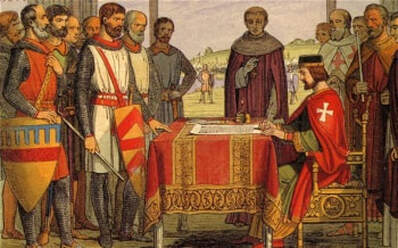
To view this as a video, click here.
To view this as a PowerPoint, click here. To listen to the audio, click here. "…I will make you a great nation; I will bless you and make your name great; and you shall be a blessing…and in you all the families of the earth shall be blessed.'" Genesis 12:1-3 Most Valuable 15 June marks the 804th anniversary of the proclamation of Magna Carta. Magna Carta has been one of the most valuable exports of Great Britain to the rest of the world. Magna Carta has truly blessed all the families of the earth. Magna Carta was the first Statute, the first written restriction on the powers of government. |
Categories
All
Archives
October 2022
|
 RSS Feed
RSS Feed